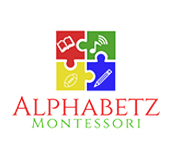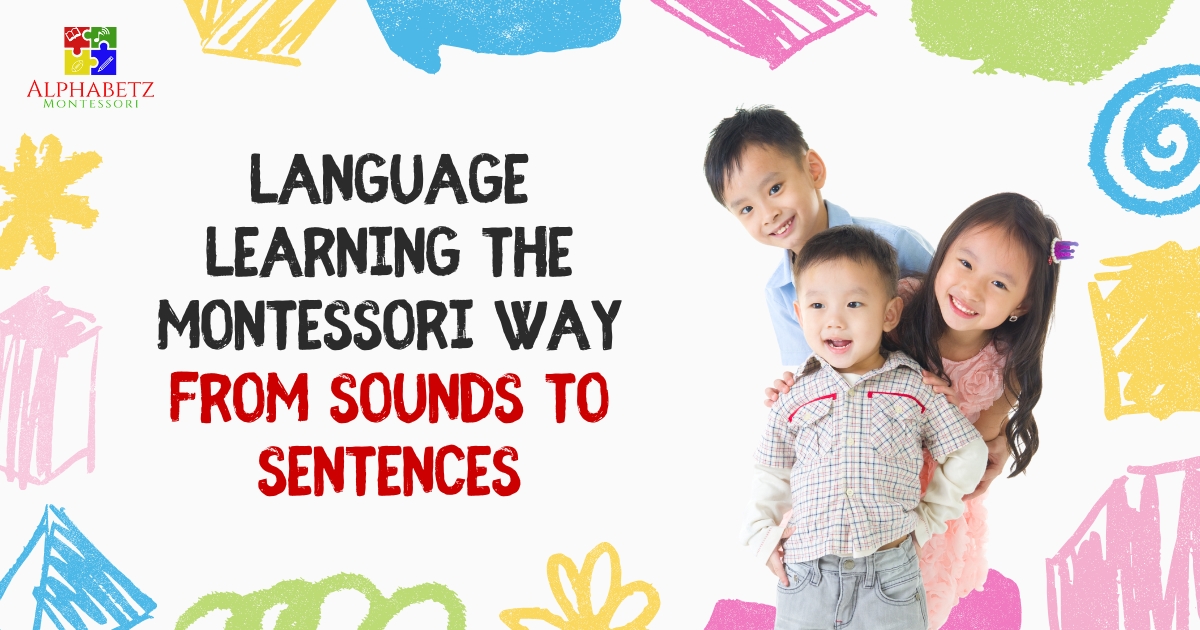Language is one of the most powerful tools a child acquires in early childhood. It allows them to express thoughts, build relationships, and understand the world around them. At Alphabetz Montessori, we follow Dr. Maria Montessori’s time-tested approach to language development is one that nurtures natural curiosity, builds strong communication skills, and makes learning an enjoyable, organic process.
The Foundation: Absorbing Language Naturally
In the Montessori environment, language learning begins long before formal lessons. From birth to around six years, children experience what Montessori called the “absorbent mind” a phase when they effortlessly absorb language from their surroundings. Teachers at Alphabetz Montessori create a rich language environment filled with conversation, songs, storytelling, and reading aloud.
Children are encouraged to express themselves freely, ask questions, and share observations. By being surrounded by meaningful communication, they naturally expand their vocabulary, learn sentence structure, and develop listening skills, the cornerstones of language mastery.
Step 1: Sounds and Phonemic Awareness
Montessori language education begins with sound recognition, not with memorizing letters. Children are introduced to the sounds each letter makes through phonetic exercises. Using the Sandpaper Letters, they trace each letter while saying its sound aloud. This multi-sensory approach helps them connect touch, sound, and sight, reinforcing their understanding in a deeper way.
This early exposure helps children build phonemic awareness and the ability to hear, identify, and manipulate individual sounds in words. It’s the foundation of reading and writing and ensures that children develop literacy with confidence and joy.
Step 2: Moving Toward Word Formation
Once children are familiar with letter sounds, they move on to word building using the Moveable Alphabet, one of the most beloved Montessori materials. Here, they arrange letters to form simple words, long before they begin writing with a pencil.
For example, a child who knows the sounds c, a, and t can form “cat” and instantly recognize the meaning. This hands-on experience helps them understand how sounds come together to form words, fostering an early love for reading and writing.
At Alphabetz Montessori, teachers guide children gently during this stage offering encouragement and allowing them to explore language at their own pace. Every new word becomes an achievement celebrated with pride.
Step 3: Expanding Vocabulary and Grammar Skills
As children progress, they are introduced to more complex words, sentence formation, and basic grammar. Montessori materials such as grammar symbols and classified cards help children understand the function of each word in a sentence, noun, verb, adjective, and more in a fun, visual way.
Through storytelling, picture cards, and matching activities, children expand their vocabulary and begin forming descriptive, complete sentences. This exploration of grammar feels like discovery rather than instruction allowing children to see language as a living, creative expression.
Step 4: Reading for Meaning and Joy
Reading in the Montessori classroom is not just about decoding words, it’s about understanding and enjoying them. Once children grasp phonetic reading, they move on to reading short sentences, picture books, and later, stories that engage their imagination.
Teachers encourage discussions about what they read, helping them develop comprehension, empathy, and critical thinking. Reading becomes a shared adventure where every story inspires new ideas and conversations.
A Journey from Sound to Sentence
At Alphabetz Montessori, language learning is not confined to a single subject area; it’s woven throughout the day. Whether children are describing objects during a science lesson or narrating their artwork, every moment becomes an opportunity to communicate and grow.
By progressing from sounds to words to sentences, children develop not only literacy skills but also confidence, creativity, and self-expression essential traits for lifelong learning.
Conclusion
Language learning in the Montessori classroom is a joyful, purposeful journey that mirrors the natural way children acquire communication skills. At Alphabetz Montessori, we celebrate every milestone from a child’s first letter sound to their first written sentence as a step toward becoming thoughtful, articulate learners.If you’d like to see how we nurture language development through Montessori principles, schedule a tour of Alphabetz Montessori today and watch your child’s love for language come alive!

